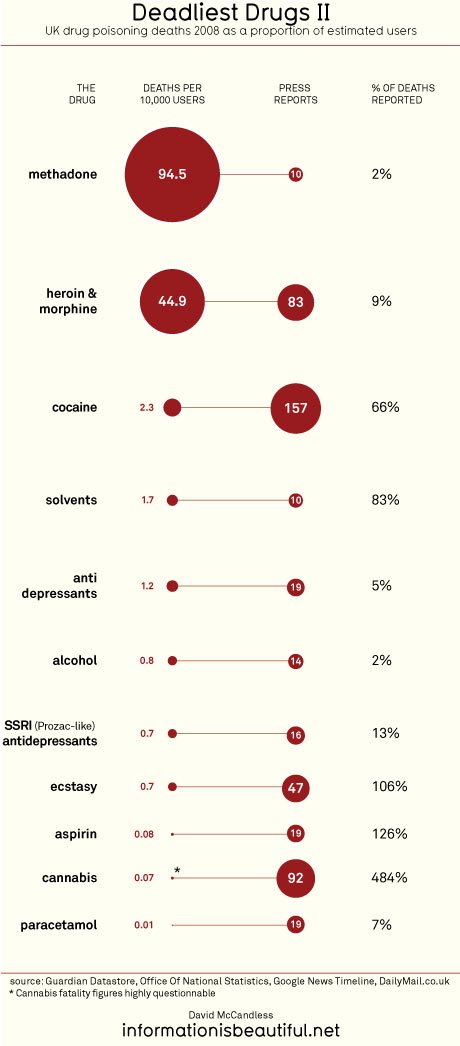Dying from a marijuana overdose in Washington and Colorado: weed turns you into a violent criminal
NICK Wing has a GIF showing all of the people who have died after overdosing on pot:
In a word, yes. But Holder says the State must include “strong and effective regulatory and enforcement systems”.
Deputy Attorney General James Cole noted:
“The Department’s guidance in this memorandum rests on its expectation that states and local governments that have enacted laws authorizing marijuana-related conduct will implement strong and effective regulatory and enforcement systems that will address the threat those state laws could pose to public safety, public health and other law enforcement interests. A system adequate to that task must not only contain robust controls and procedures on paper; it must also be effective in practice.”
The DOJ will still prosecute individuals or entities to prevent:
the distribution of marijuana to minors;
revenue from the sale of marijuana from going to criminal enterprises, gangs and cartels;
the diversion of marijuana from states where it is legal under state law in some form to other states;
state-authorized marijuana activity from being used as a cover or pretext for the trafficking of other illegal drugs or other illegal activity;
violence and the use of firearms in the cultivation and distribution of marijuana
drugged driving and the exacerbation of other adverse public health consequences associated with marijuana use;
growing of marijuana on public lands and the attendant public safety and environmental dangers posed by marijuana production on public lands;
preventing marijuana possession or use on federal property.
Not that everyone is happy with the relaxation of the rules. A letter is sent by a raft of high-ranking police officers:
Dear Attorney General Holder,
On behalf of the undersigned national law enforcement organizations, we write to express our extreme disappointment that the U.S. Department of Justice does not intend to challenge policies in Colorado or Washington that legalize the sale and recreational use of marijuana in contravention of Federal law. Further, the Department reiterated its intent to enforce the Federal Controlled Substances Act (CSA) in eight priority areas, however, these will be
extremely difficult for Federal, state, local and tribal law enforcement agencies to enforce in practice given the recently approved referendums. As law enforcement officials, we are charged with enforcing the law and keeping our neighborhoods and communities safe—a task that becomes infinitely harder for our front-line men and women given the Department’s position.The decision by the Department ignores the connections between marijuana use and violent crime, the potential trafficking problems that could be created across state and local boundaries as a result of legalization, and the potential economic and social costs that could be incurred. Communities have been crippled by drug abuse and addiction,stifling economic productivity.
Maybe that link between the drug and crime by the simple fact that weed is is illegal?
Specifically, marijuana’s harmful effects can include episodes of depression, suicidal thoughts, attention deficit issues, and marijuana has also been documented as a gateway to other drugs of abuse.
So. Why not ban alcohol, then?
Marijuana use has had devastating effects in our communities with over 8,000 drugged driving deaths a year, many of which involved marijuana use. Data from Colorado demonstrate the consequences of relaxed marijuana policies that lead to increased use: fatalities involving drivers testing positive for marijuana increased 114 percent between 2006 and 2011. Youth admissions into emergency rooms for marijuana-related incidents have also increased in Colorado. From 2005-2008, the national average for ER admissions for marijuana-related incidents was 18 percent, while in Colorado it was 25 percent. From 2009-2011, the national 2 average increased to 19.6 percent, while in Colorado it rose to 28 percent. Additionally, the Department of Health and Human Services issued a report showing that for drug-related emergency room visits among youth aged 12-17 the leading drug involved in the incident was marijuana. In addition, officials have documented major increases in exports of marijuana from Colorado to other states between 2010 and 2012.
Improve drugs test. Invest in better public transport. Warn people of the perils of drug driving.
As with many other drugs, marijuana can also be directly tied to violent crime. As recently as May of 2013, the Office of National Drug Control Policy (ONDCP)released a report showing that marijuana is the most common drug found in the systems of individuals arrested for criminal activity.
Eh. Weed makes you a criminal?
The ONDCP study found that eighty percent of the adult males arrested for crimes in Sacramento, California, last year tested positive for at least one illegal drug. Marijuana was the most commonly detected drug, found in fifty-four percent of those arrested. Similar results were found in other major cities such as Chicago, Atlanta and New York.
The conclusion that can be drawn from these facts is that relaxed marijuana policies lead to clear and foreseeable negative consequences for communities and families.
But it won’t make your child a criminal for possessing marijuana, right?
Marijuana is illegal under Federal law and should remain that way. While we certainly understand that discretion plays a role in decisions to prosecute individual cases, the failure of the Department of Justice to challenge state policies that clearly contradict Federal law is both unacceptable and unprecedented. The failure of the Federal government to act in this matter is an open invitation to other states to legalize marijuana in defiance of federal law.
We strongly encourage you to consider all the potential implications of the Department’s decision not to enforce Federal law on marijuana sale and use in Colorado and Washington. The decision will undoubtedly have grave unintended consequences, including a reversal of the declining crime rates that we as law enforcement practitioners have spent more than a decade maintaining.Our number one goal is to protect the public and ensure its safety. The Department’s decision undermines law enforcement’s efforts to carry out this responsibility and will not aid in maintaining public safety.
Crime rates will go up if you make illegal things legal… Got that?
As for dying on a weed overdose. Andrew Sullivan rounds-up the evidence:
Judge Young’s findings from the 1988 DEA hearing [pdf] that considered reclassifying marijuana as a Schedule 2 drug:
Nearly all medicines have toxic, potentially lethal effects. But marijuana is not such a substance. There is no record in the extensive medical literature describing a proven, documented cannabis-induced fatality. This is a remarkable statement. First, the record on marijuana encompasses 5,000 years of human experience. Second, marijuana is now used daily by enormous numbers of people throughout the world… Yet, despite this long history of use and the extraordinarily high numbers of social smokers, there are simply no credible medical reports to suggest that consuming marijuana has caused a single death…
In a 2009 paper [pdf] on non-medical use of cannabis, Wayne Hall and Louisa Degenhardt round up the literature on its short- and long-term health effects. On the acute effects:
A dose of 2–3 mg of THC will produce a high in occasional users who typically share a single joint with others. Regular users might smoke up to 3–5 joints of potent cannabis a day for several reasons, including development of tolerance and to experience stronger effects… The dose of THC that kills rodents is very high and the estimated fatal human dose is between 15 g and 70 g, which is much higher than that smoked by a heavy user.
Note that the fatal dose is at least 5,000 times the dose that will produce a high in occasional users. On driving while high:
Studies of the effects of cannabis upon on-road driving found more modest impairments than those caused by intoxicating doses of alcohol because cannabis-affected people drive more slowly and take fewer risks. Nonetheless, some experimental studies have shown diminished driving performance in response to emergency situations… Driving after having taken cannabis might increase the risk of motor vehicle crashes 2–3 times compared with 6–15 times with alcohol.
On the effects of chronic use, “defined as almost daily use over a period of years”:
In Australia, Canada, and the USA, cannabis dependence is the most common type of drug dependence after that on alcohol and tobacco… The lifetime risk of dependence in cannabis users has been estimated at about 9%, rising to one in six in those who initiate use in adolescence. The equivalent lifetime risks are 32% for nicotine, 23% for heroin, 17% for cocaine, 15% for alcohol, and 11% for stimulant users.
David McCandless:
There has never been a single documented case of fatal cannabis overdose. Also, the government’s own figures don’t tally. While drug figures from theOffice Of National Statistics register 19 cannabis related deaths, the mortality stats from the same office log only 1 death.
Death-rate were assessed per user of each drug:
And it never did him or any of them any harm…
Posted: 7th, September 2013 | In: Key Posts, Reviews Comments (9) | TrackBack | Permalink





